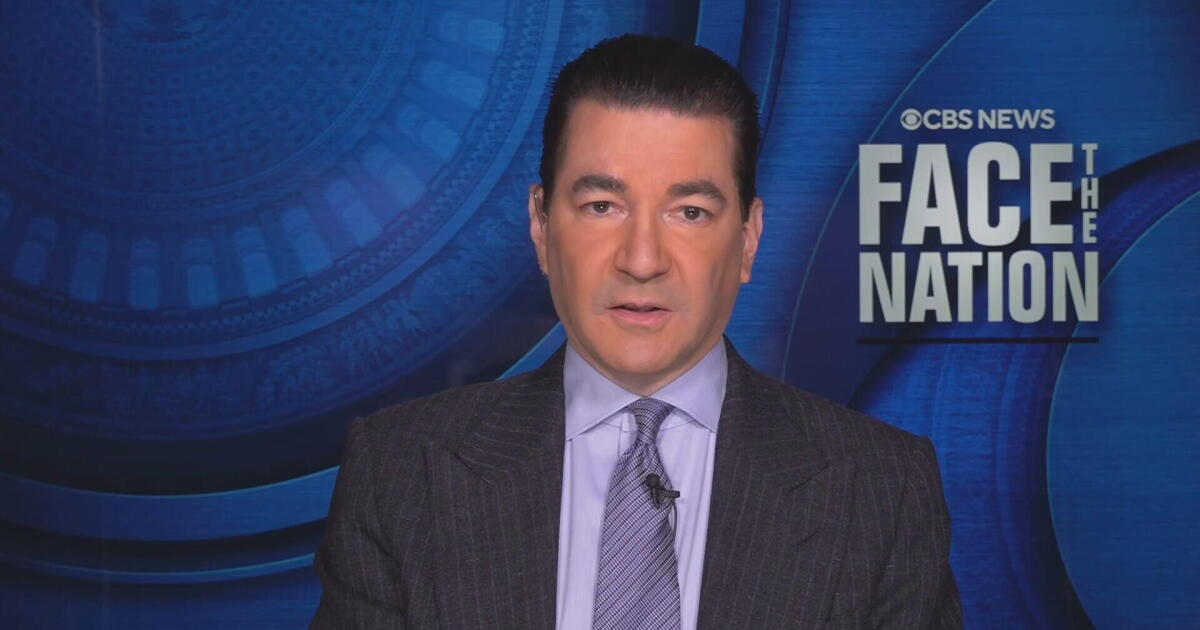MARGARET BRENNAN: We turn now to Dr. Scott Gottlieb. He’s a former FDA commissioner and current Pfizer board member. Welcome back, Dr Gottlieb.
DR. SCOTT GOTTLIEB: Thanks a lot.
MARGARET BRENNAN: We’ve seen these troubling measles outbreaks in Texas and New Mexico, nearly 100 people sickened. It looks like most of those who have been infected were unvaccinated, and the outbreak area has one of the highest vaccination exemption rates in the state. How concerned are you though that this could spread?
SCOTT GOTTLIEB: Very concerned. I think this will spread. There’s been 100 cases that have been identified so far. There’s probably many more than that. So I think that this is going to get into the hundreds of cases, and could take many months to try to fully snuff out. And when you have that kind of a concentration of measles within a community, it’s going to inevitably spread outside that community. When you look around the country, there’s a lot of parts of the country, states that have relatively low vaccination rates when it comes to MMR, right now,. You look at Idaho, about 80% of children have been vaccinated for MMR. Alaska and Wisconsin are about at 84%, Minnesota 87%, states like Florida, Colorado, Oklahoma, Georgia, Utah, around 88% Iowa, I think, said 89% and herd immunity is achieved at a vaccination rate of between 93 and 95% and even within those states, it’s not like the low vaccination rates are distributed evenly across the states. There’s pockets of under vaccination. There’s communities that have relatively low vaccination rates and so when you have this much virus spreading in that portion of Texas and New Mexico, I think that there’s some inevitable- inevitability that you’re going to see cases exported into those other states where there’s low vaccination rates, and you could see a continuous spread across the country. Even at a low level, we could get some endemic spread. And the risk to the United States right now is that a virus that has been largely extinguished from circulation in the U.S. could return and just continue to spread, even at a low level, and the U.S. could be at risk of losing its measles elimination status, which would have more profound implications on things like travel advisories that could be initiated from other countries. And so beyond just the public health impact of this, which I think is quite substantial, there could be some economic impacts as well. And finally, when you look at that outbreak in- in Texas, 27% of people have been hospitalized and there’s been four cases where children have contracted measles that have been vaccinated. So those are probably kids who only had one dose of the vaccine. But there’s a lot of people who are at risk of this, beyond just the people who have chosen to forego the vaccine.
MARGARET BRENNAN: That’s terrifying, doctor and- and kids are usually vaccinated, as any parent knows, around one year old, roughly. The MMR vaccine, though- this is the vaccine against measles, is particularly scrutinized. Robert F. Kennedy Jr., who is now the HHS Secretary, has accused of causing issues in children. He wrote the forward to a book questioning vaccines, saying ‘measles is a disease that is rarely life threatening and a vaccine that is largely unnecessary but carries real risks.’ He is now the HHS Secretary, how does he restore confidence in a vaccine that he previously denigrated?
SCOTT GOTTLIEB: Look, I think it’s going to be difficult. And as best I can tell, he hasn’t spoken to this outbreak. I think you captured the essence of the argument from Mr. Kennedy, as well as people within his anti-vax movement, that they believe this vaccine isn’t effective. That’s not true. It’s highly effective, and that measles itself isn’t a bad illness. And I think there’s been some statements that actually getting measles has certain long term advantages, which is just patently false. This is a very dangerous virus, and as I said, about 27% of the kids who have been infected in that West Texas outbreak and the New Mexico outbreak have been hospitalized. So this could be a quite serious illness with long term consequences. Herd immunity is achieved at 93 to 95%. We’re well below that in most parts of the country. Texas actually has a high vaccination rate, and I think Texas local public health officials are doing a good job to try to get control of this outbreak, but now that it’s stretched into the hundreds of cases, it’s going to be very difficult. This has been a vaccine that’s been studied extensively, the links between- the alleged links between MMR vaccine and autism have been the subject of some of the most- the largest studies ever undertaken. There were two studies done in Denmark, each with about 500,000 children enrolled in those studies. There were also a number of studies that were commissioned by the CDC and the NIH also looking at this in the United States. And so this is one of the most extensively studied questions, the purported link between MMR and autism. And I think the reality is, sometimes we have to accept no for an answer, that there just is no link between the MMR vaccine and autism.
MARGARET BRENNAN: Yeah and those studies were brought up by Dr Cassidy, Senator Cassidy, in the hearing, and Mr. Kennedy would not affirm them. Senator Cassidy still voted for him, though, but I want to ask you about another issue. Our correspondent Camilo Montoya-Galvez has learned the Trump administration is preparing plans to use a health authority known as Title 42, which you remember was used during the pandemic to restrict migrant agents- entries across the southern border. Now they want to invoke it on the basis of other diseases like TB. Is that warranted right now? Is TB that much of a problem?
SCOTT GOTTLIEB: Well, look, I- I think from a policy standpoint, the administration has done a good job shutting down flows across the border, so I’m not sure why they’re reaching for a public health measure to try to provide an additional provision, additional tool. They seem to have done a good job with the law enforcement that they’re doing at the border, just from the objective standpoint of TB and the risk of TB being transported across the border. TB incidence rates are high in the countries where immigrants are coming from, but they’re not exceedingly high relative to other countries. So you look at a country like Mexico, the incidence of TB is about 30 cases per 100,000 people. In Venezuela, where there’s also immigrants coming from, it’s about 45 per 100,000. That compares to about 10 per 100,000 in a country like England. But you look at a country like India, the incidence is about 200 per 100,000. In South Africa, it’s about 500 per 100,000 so there’s a lot of countries around the world where people come in from all the time, where the incidence of TB is much higher than what- what it is in the countries where people are coming across the border from. Now, you can argue that people coming in the country from South Africa or India are going through regular checkpoints where they might undergo some screening, but I think just purely from an objective public health standpoint, there’s probably parts of the world where we have immigrants coming in that provide a larger risk of the transmission of TB than across the border.
MARGARET BRENNAN: Can you give us some perspective on the thousands of employees who are being dismissed from federal health agencies? Should the public be concerned?
SCOTT GOTTLIEB: Look, I don’t- I don’t think they should be concerned. I think that there have been steps taken to try to readjudicate some of those initial dismissals, at least within the public health context. When you look across HHS, and I’m most familiar with FDA, where they’re hiring back a number of employees, and I think they could hire back fully half of the employees that were initially dismissed at the FDA, and they’ve tried to preserve things like review functions and inspectors at FDA. They didn’t do it perfectly because of the way they went about this. They riffed the probationary employees. So they did catch some employees, I think are in critical functions. They seem to be hiring them back. You know, just objectively, they look at this and they say, well, the number of people hired has gone up a lot in recent years, and they want to reduce head count, and so I think they need to be more judicious about who they target.
MARGARET BRENNAN: Dr. Gottlieb, I’m sorry, I got to leave it right there. We’ll be right back.
Politics
#Transcript #Scott #Gottlieb #Face #Nation #Margaret #Brennan #Feb



